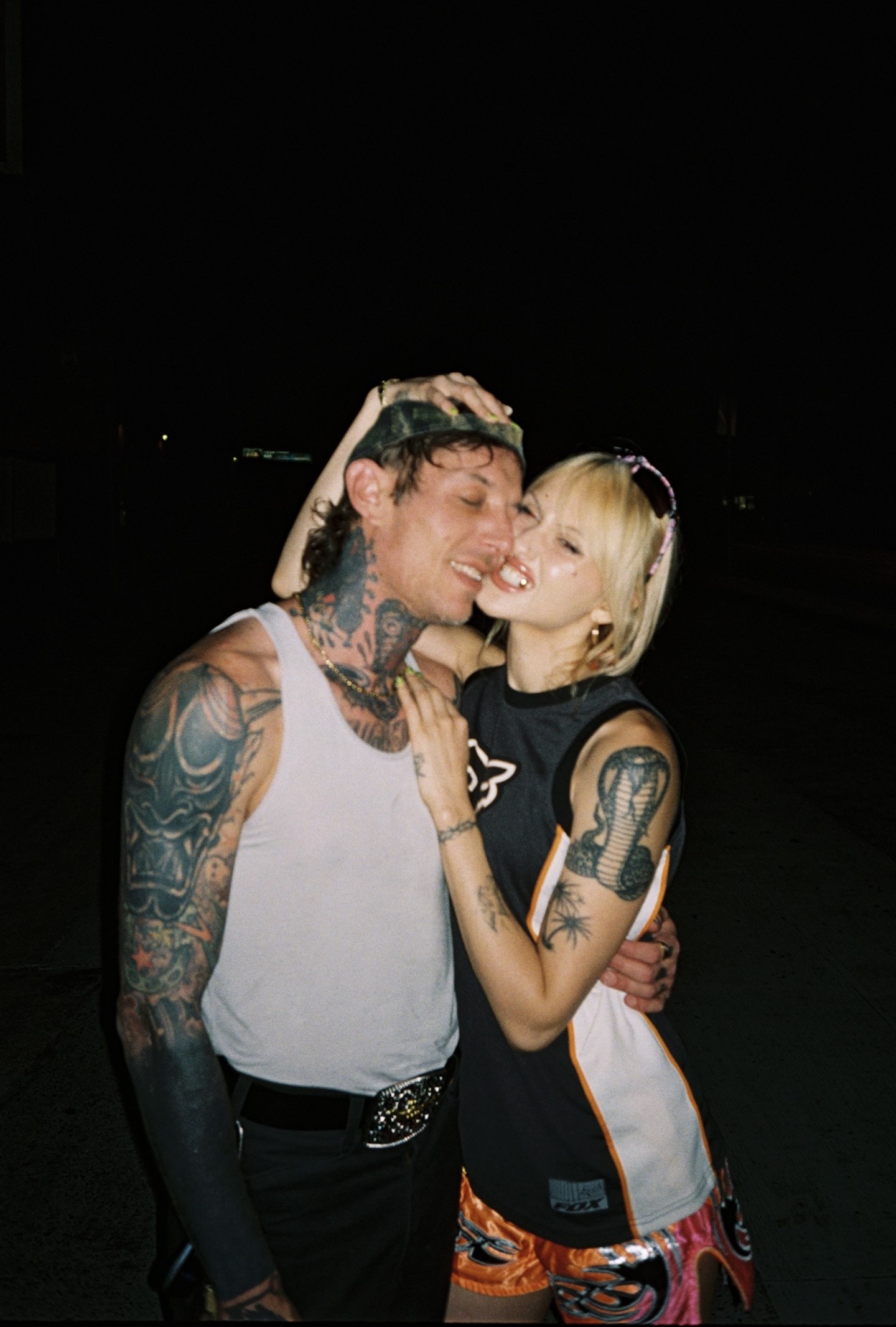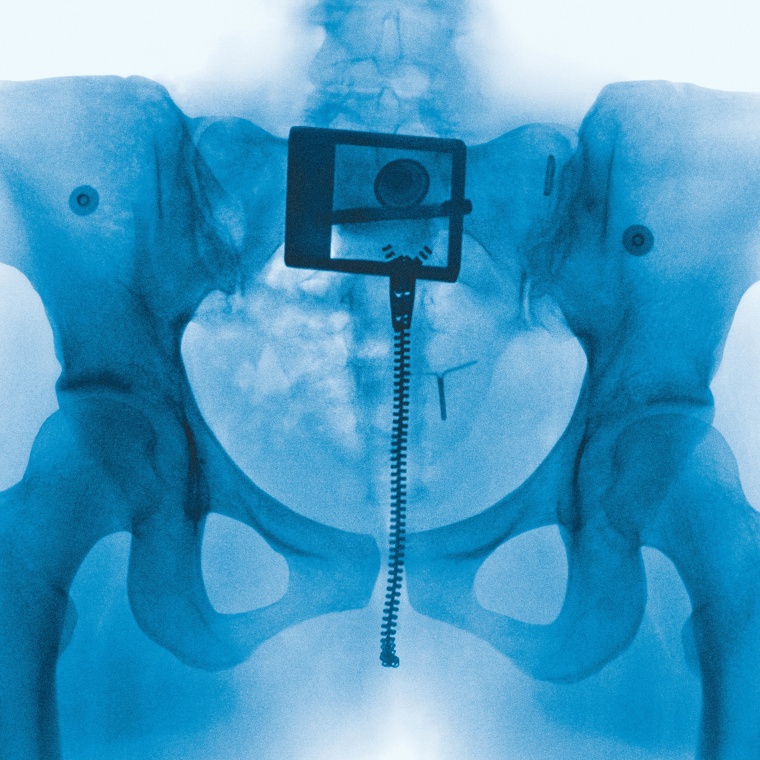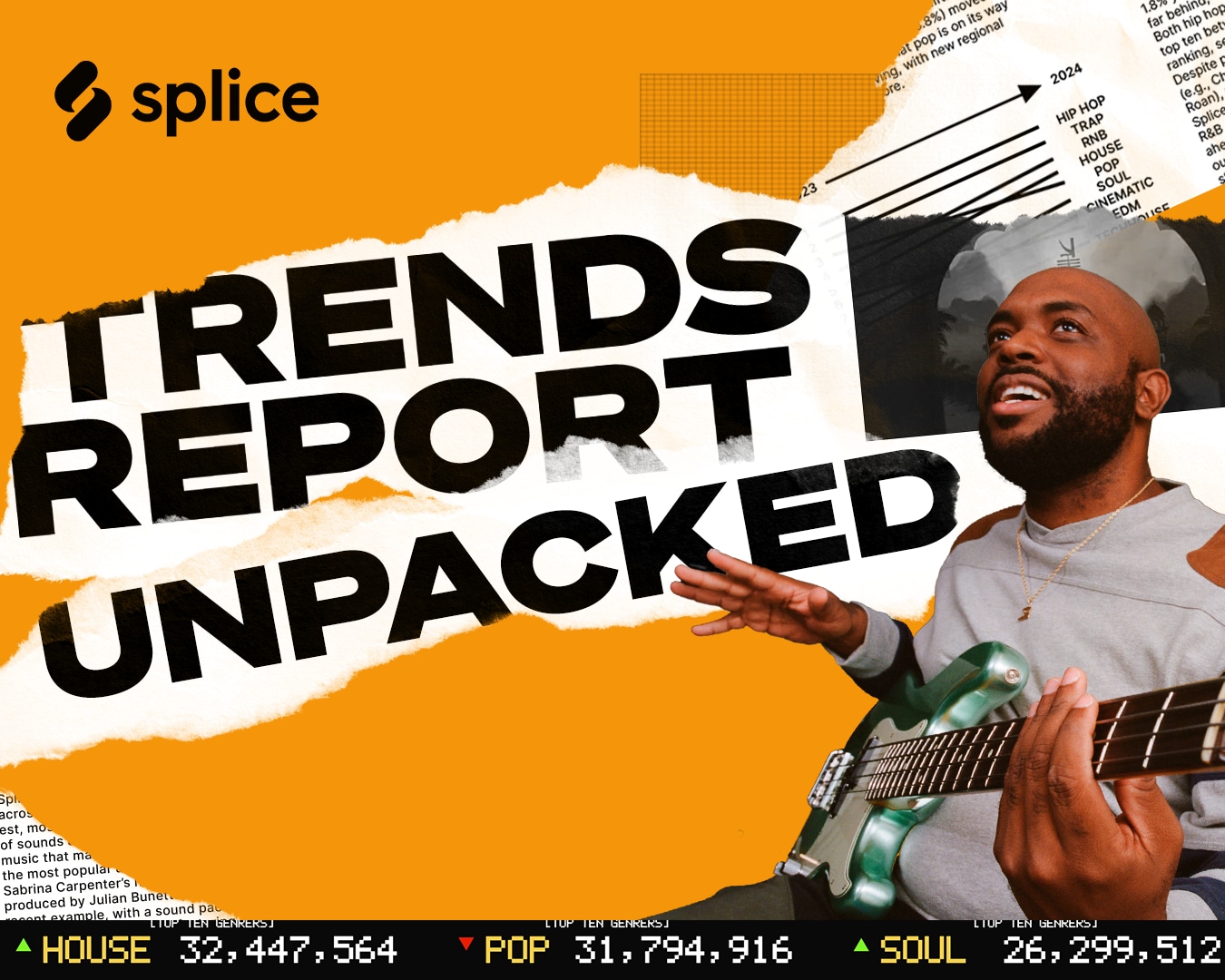VANITY PL8
Jack Angell
VANITY PL8‘s Anastasiya Bobrova grew up in Yakutsk, the coldest city on Earth, on the fourth floor of an apartment block surrounded by a thick layer of Siberian permafrost. Her paternal grandpa was a German P.O.W. sentenced to hard labor at a nearby gulag, while her maternal grandfather was a well-known poet. Placed in his care as a toddler, she spent her childhood in the cold until her mother returned when she was nine, with her new Ukrainian step-dad and a one-way ticket to suburban Utah.
At this point, the VANITY PL8 songwriter can’t help but laugh at the absurdity of her own upbringing, recalling an adolescence spent mud-trucking, riding motocross, and going to the rodeo. Her expression softens when she talks about those years, thinking about the “nostalgia of that fucking reckless, suburban, haphazard, sun-soaked, fun environment,” and how it was “complete Woodstock ‘99 vibes.” She deepens the connection even further by mentioning her teenage love of that festival’s headliners Limp Bizkit and Sugar Ray, whose catchy hooks and pop-punk melodies influenced the sound of “PT Loser,” the lead single from VANITY PL8’s debut Bikini Daycare EP.
Alongside partner and VANITY PL8 producer Brandon Pierce, the couple never planned to have a project together. Instead, it started organically, with Bobrova writing “PT Loser,” a scathing diss track disguised as a radio-friendly sparkler about a “spineless princess trauma-hoarder.” Melodic yet oddly menacing, it’s a catchy carousel of jangling tambourines and new romantic synths alongside Bobrova’s anthemic vocals, smirking as she pointedly asks, “what’s gonna be your next mood disorder?”
“PT Loser,” however, is just one facet of VANITY PL8’s sound, which is defined by its melancholy and gritty production. Between Bobrova and Pierce, they cite a wide range of influences ranging from The Replacements’ garage pop-punk to Massive Attack’s otherworldly trip-hop to Tom Petty’s expressive storytelling, as exemplified by Bikini Daycare track “Miss Universe.” With a sound that’s reminiscent of Hole’s unfiltered grunge mixed with an industrial-tinged Garbage chart-topper, “Miss Universe” is a much darker rumination on Bobrova’s internal struggle with manic depression, suicidal ideation, and substance use. Through allusions to the publicly broadcast struggles of famous women like Angelina Jolie and Anna Nicole Smith, “Miss Universe” is an abrasive, angst-ridden grunge track that radiates a sort of pain that feels achingly familiar. For the women still haunted by their own adolescent experiences, Bobrova’s words are chillingly brutal, almost too relatable as she scream-belts, “I’m PJ Harvey starving can’t you see / I’d like to get Rid of Me.”
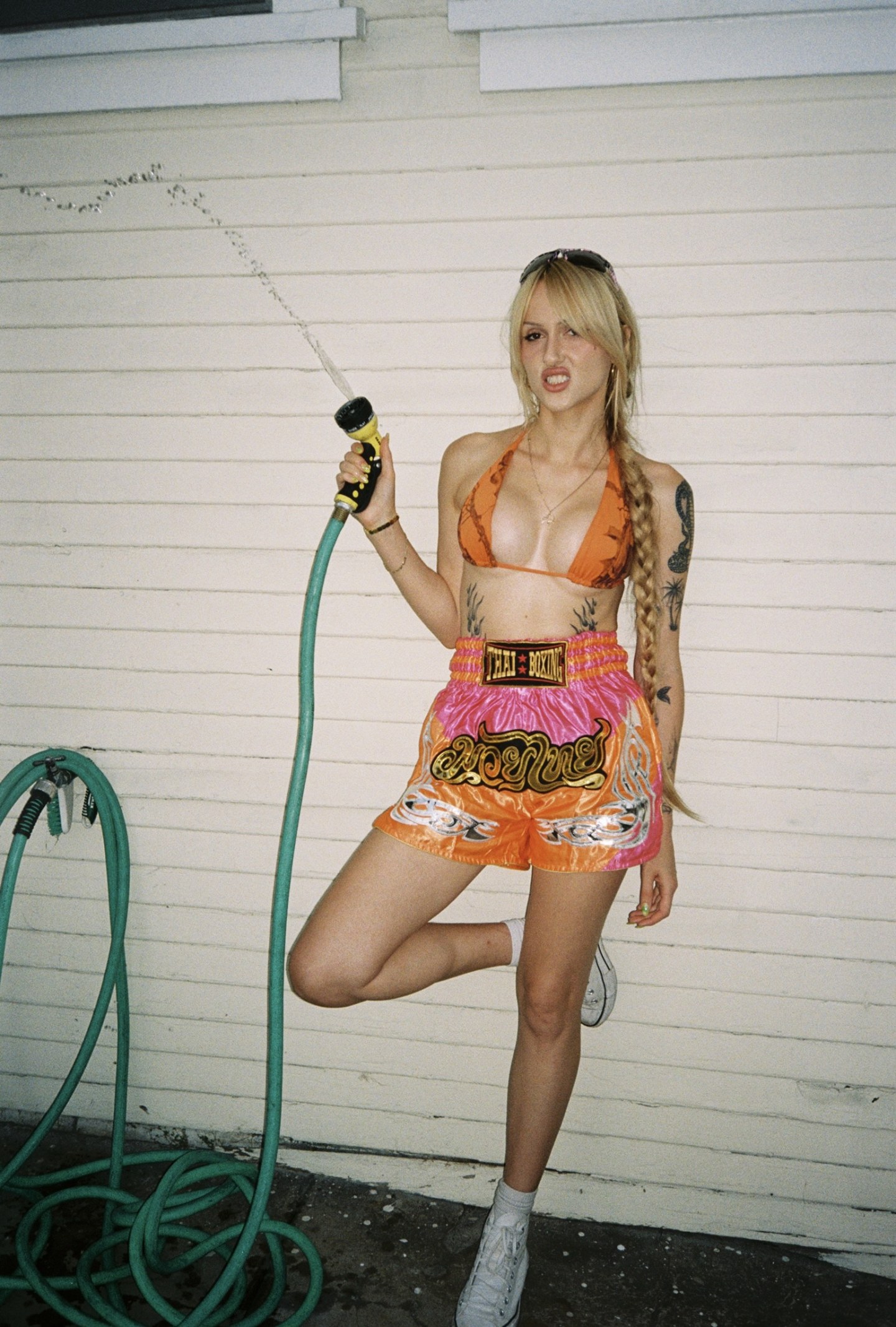
Anastasiya Bobrova
Jack Angell
Bobrova wasn’t always this open with her music. After moving to Salt Lake City, she was the bassist and sole woman in a small shoegaze band, an experience that took a toll on her self-esteem. Within a few years, the girl who used to beat the boys at motocross had become a shrinking violet, maintaining her distance from others by adopting a self-serious outlook and an aura of aloofness. She felt like “something just clicked” a few years ago, though, recalling her desire to “have a different outlook on life” and to be more friendly and easygoing.”
Bobrova smiles over at Pierce, who she met around the same time. They’ve been together ever since, she says, joking about two “gluttons for punishment” that helped each other enjoy life and “not be fucking sad.”
“It was like, ‘What’s wrong with fun fucking hooks? And now I want music that commands me to either sing or dance along to. Otherwise, it’s not for me,” Bobrova adds. “I guess, I just want to live more viscerally, lean into the whimsy and going back to who I was when I was 15.”
With its list of barbed insults, “PT Loser” could seem like a “mean girl” song fueled by low blows and superficial insults, even though these hints of immaturity are completely intentional. But Bobrova explains that it’s more about no longer “trying to police my words” for the sake of other people’s feelings. Like everyone else, she has the innate right to process her own hurt and protect herself, especially if she feels like someone is weaponizing her empathy against her. And while it’s a newfound mindset that takes some getting used to, Pierce’s love and unconditional support has played a huge role in bolstering her confidence, to the point where she feels strong enough to play music again.
“He gave me so much safety, and space, and the encouragement that no one in my life has ever given me before,” she says excitedly.
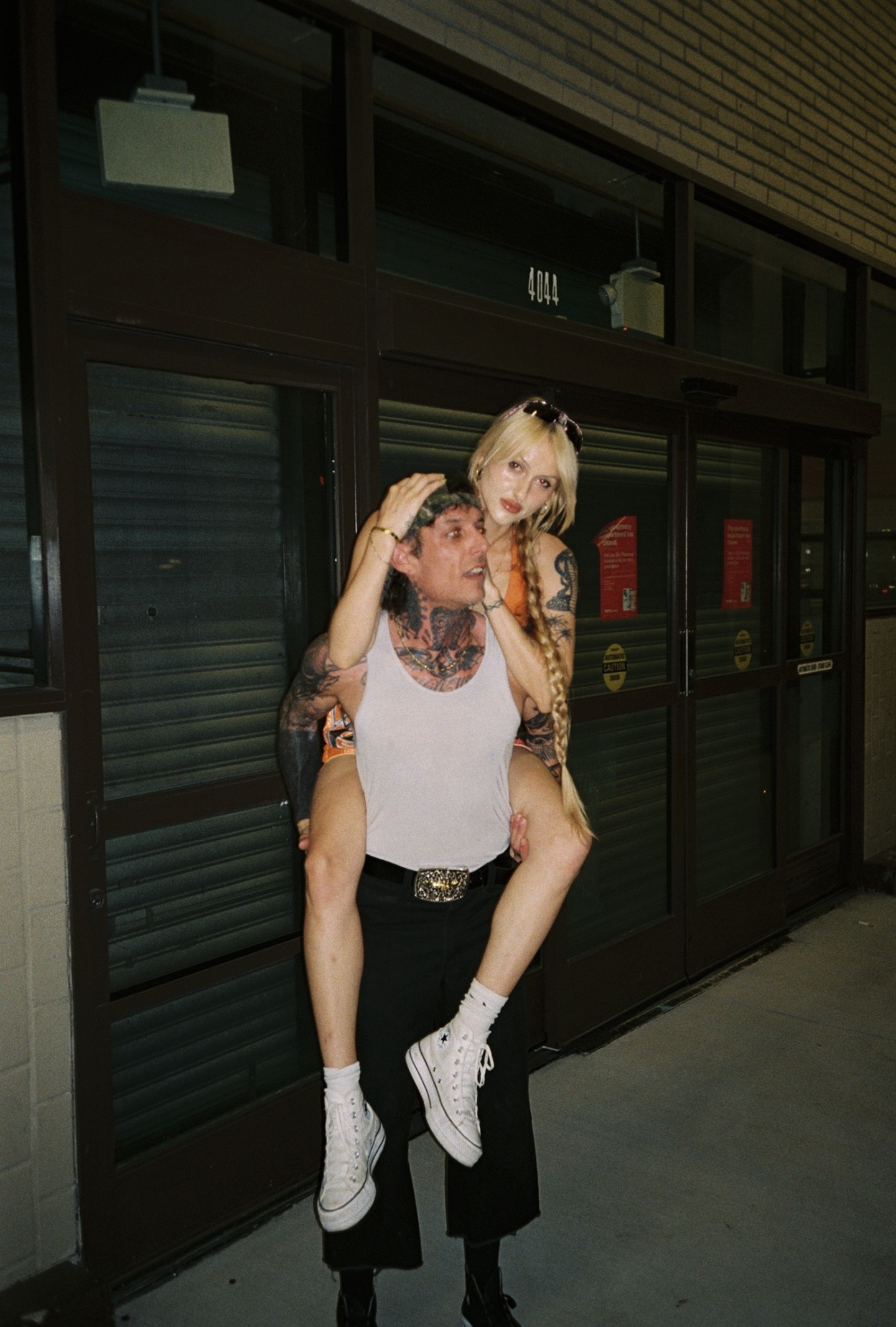
Jack Angell
“I finally feel like a powerful person that can wield their creativity, because he’s given me the platform and all of this,” Bobrova gestures towards the soundproofed walls, covered in racks of equipment, and then towards Pierce, which finally grabs his attention. Almost immediately, he echoes Bobrova’s praise before calling her “the best possible partner to have as a mouthpiece.”
But more importantly, she’s the first collaborator who’s ever “inspired [him] to come from this angle of vulnerability,” he says. As someone whose own self-worth has been trampled by an endless cycle of physically and emotionally abusive relationships, romantic and platonic, “everything I’ve ever made in the past has come from a place of pain,” he says.
Their love for each other is palpable, as Pierce returns Bobrova’s gaze and begins to tear up.
“But even when there’s pain now, it’s not coming from a dark place,” he says, eyes still locked on his partner. “It’s coming from his place of love and vulnerability.”

